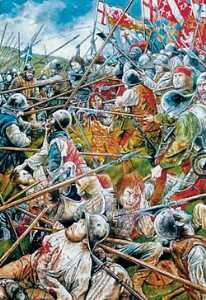
The battle of Flodden in 1513. Thus perished the
flower of Scotland - the King, two abbots, at least nine earls, 15 barons, many lairds. Among the dead
was Sir John Somerville.
Somerville family
The first of the surname of Somerville of which we have any record, is Sir Gualter (Walter) de Somerville, a Norman Knight, who, with other adventurous spirits, attached themselves to William the Conqueror, and landed with him in Britain in 1066. Sir Gualter (1st Baron) was thus the ancestor and founder of the families of the two powerful territorial houses of Somerville who flourished in England for nearly 300 years, and in Scotland for 700 years.
We read that Somerville, near Evreaux, in Normandy was the place from which the family drew its name, and which Sir Gualter left in order to follow the fortunes of William the Conqueror. This knight, for his services and share of the spoils on the conquest of England, was rewarded by William with a gift of the lands and barony of Whichenour and Burtone (Burton-on-Trent) in the County of Stafford.
The first of this name in Scotland was one William de Somerville, who came in the train of David I and received lands in Lanarkshire. There were five Williams in succession, the last dying in 1282. During the reign of William the Lion, William de Somerville slew a monstrous animal or serpent which was terrorising the district of Linton, Roxburghshire. In 1174 he was rewarded with the lands of Linton. Robert de Sumeruilla witnessed a charter by Duncan, Earl of Fife, to the Nuns of North Berwick c.1177. Ralph de Sumervilla, acolyte, was promoted to the church of Linton in 1255. William Somerwele of the Plane, was a charter witness in Edinburgh in 1492 and John Semrell was a tenant under the Abbey of Kelso in 1567. In 1430 the title Lord Somerville was conferred on Sir Thomas Somerville. In December 1423 he was given a safe conduct to England to meet James I and he was one of the guarantees of the treaty for his release in December 1424. John, third Lord Somerville, was wounded at the battle of Sark against the English in 1448. He had a son, Sir John Somerville of Cambusnethan, who was killed at Flodden in 1513. The peerage ceased in 1870 on the death of the seventeenth Lord. .... more
- A1 ~ Sir Gualter de Somerville, lvd:1066;
- B1 ~ William de Somerville, d:1142;
- C1 ~ William de Somerville;
- D1 ~ William de Somerville;
- E1 ~ William de Somerville of Linton and Carnwath, lvd:1281, m. Margaret de Newbigging;
- F1 ~ Sir Thomas de Somerville;
<========
- F1 ~ Sir Thomas de Somerville;
- E1 ~ William de Somerville of Linton and Carnwath, lvd:1281, m. Margaret de Newbigging;
- D1 ~ William de Somerville;
- C1 ~ William de Somerville;
- G1 ~ Sir Thomas de Somerville of Linton and Carnwath, m. Elizabeth Douglas;
==> Clan Douglas
- H1 ~ Sir William Somerville of Linton and Carnwath, m. Katherine Halliday;
- I1 ~ Thomas Somerville, 1st Lord, d:1444, m. Janet Stewart;
==> Clan Stewart
- J1 ~ William Somerville, 2nd Lord, d:1456, m. Janet Mowat;
- K1 ~ John Somerville, 3rd Lord, d:1491, m1. Helen Hepburn, m2. Mariotta Baillie;
==> Baliol family
- L1 ~ [m1]: Elizabeth Somerville, m. Archibald Campbell; <== Clan Campbell
- L2 .. [m2]: Sir John Somerville of Quothquan, lvd:1447/1513 Flodden, m. Elizabeth Charmichael;
- M1 .. Helen Somerville, m. Robert Boyd; <== Clan Boyd
- K1 ~ John Somerville, 3rd Lord, d:1491, m1. Helen Hepburn, m2. Mariotta Baillie;
==> Baliol family
- J1 ~ William Somerville, 2nd Lord, d:1456, m. Janet Mowat;
- I1 ~ Thomas Somerville, 1st Lord, d:1444, m. Janet Stewart;
==> Clan Stewart
- H1 ~ Sir William Somerville of Linton and Carnwath, m. Katherine Halliday;
- B1 ~ William de Somerville, d:1142;